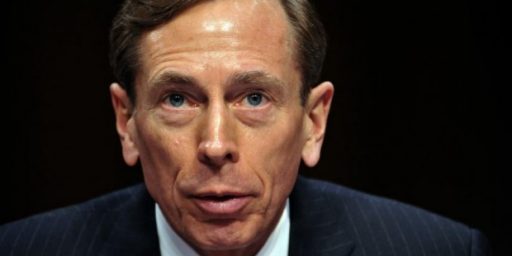Democrats Retreating on Iraq Withdrawal
Ed Morrissey thinks the recent testimony by General David Petraeus has “made it much more difficult for Democrats to argue for withdrawal and defeat. In fact, at last night’s debate, the leading contenders for the Democratic nomination couldn’t even commit to a withdrawal — by 2013.”
The leading Democratic White House hopefuls conceded Wednesday night they cannot guarantee to pull all U.S. combat troops from Iraq by the end of the next presidential term in 2013.
“I think it’s hard to project four years from now,” said Sen. Barack Obama of Illinois in the opening moments of a campaign debate in the nation’s first primary state.
“It is very difficult to know what we’re going to be inheriting,” added Sen. Hillary Rodham Clinton of New York.
“I cannot make that commitment,” said former Sen. John Edwards of North Carolina.
Sensing an opening, Sen. Christopher Dodd of Connecticut and New Mexico Gov. Bill Richardson provided the assurances the others would not.
It strikes me as unlikely that Petraeus’ testimony is what’s at issue here. For one thing, the people who will vote in Democratic primaries already have their mind up on this issue and are vehemently opposed to remaining in Iraq. Indeed, most of them are angry at their leadership for not moving further on the issue and a not insignificant number of them agree in substance, if not in style, with the MoveOn ad saying Petraeus is a mere shill for the Bush administration. Further, the polling I’ve seen seems to show that the testimony had little or no effect on public opinion, period.
Still, there’s no doubt that the major candidates for the Democratic presidential nomination are reluctant to give a firm commitment on withdrawing troops from Iraq. The reason, I suspect, is that there’s a vast difference in running for president and running for Congress. Those with a plausible chance of being elected Commander in Chief have much less luxury to be glib and reactionary in their foreign policy pronouncements, since they would actually have to execute those policies upon taking office.
Christopher Dodd and Bill Richardson are serious, honorable men but they’re not going to get elected president and are therefore free to go with their gut and/or pander to the base. Whatever visceral preferences they might have, Clinton, Obama, and Edwards are bound by the realities of the situation.
That reality, like it or not, is that there aren’t a lot of good options. (The old age that for every complicated problem there’s a solution that’s simple, easy, and wrong is particularly apt here.) Even if one is persuaded that staying in Iraq exacerbates the situation and/or only prolongs the inevitable, the logistics of withdrawal preclude simply packing up and being out in three months or six months. And no potential president wants to tie his hands on the most important issue of the day sixteen months before they would take office.
For a roundup of other news and reactions to last night’s Democratic debate, see Memeorandum.
UPDATE: Kevin Drum doesn’t think this holds water and offers a simpler explanation: “the major Dems aren’t promising to get out of Iraq because they don’t think it’s a winning position. Even in the Democratic primaries, they don’t think it’s a winning position.”
That could well be the case. The electoral politics of this are almost as convoluted as the strategic calculations.
While I still hold the reluctant conclusion that continuing the fight in Iraq is our least worst strategic option and Kevin thinks continuing is madness, we come to the opposite conclusions on the politics. I’ve believed for months that the war was unsustainable politically and take the polls showing that the public is overwhelmingly tired of the polls seriously. Conversely, mainstream Democrats fear being portrayed as weak on national security will again derail their chances of taking back the White House.
I’m not sure what that means, exactly, but it’s interesting.






Quite the pickle to be in eh?. Netroots on one side, Presidential aspirations on the other.
Y’know, from every indication, Americans still hold the same opinions they held when they voted in a Dem majority to Congress. Why the Dems (both in Congress and POTUS-wannabees) think those opinions have somehow magically changed since November is beyond me.
Methinks what’s changed is that the Dems have looked at Congress’ approval rating since those elections and come to suspect that the conclusions they drew about their victory in last year’s elections may have been in error.
I don’t think the aspirants are retreating so much as letting the cat out of the bag. The first tier Democratic candidates have actually been pretty consistent on this: none have promised to remove all U. S. troops from Iraq as soon as they get into the White House.
Sen. Clinton (IMO the inevitable nominee) has been trying to have it both ways. On the one hand she wants to remove U. S. forces from Iraq as soon as possible. On the other hand, that task won’t be accomplished during her first term. If she’s very careful no one will notice that, once the persiflage is removed, that position is hard to distinguish from that of the Bush Administration.
Definitely something to this. I agree Clinton has been especially coy on this and Obama and Edwards have been implying they’d go for a quick withdrawal without quite saying so.
McGehee, when has Congress ever had high approval ratings?
Myself, I don’t think that “most Americans,” or at least the non-partisan center, are committed either to staying in or getting out of Iraq.
What they want, above all, is to believe that, whichever policy we follow, it’s being handled competently, by leaders who deserve to have our soldiers’ lives in their hands.
That is why the public doesn’t trust Bush — they don’t believe that of him any more. But they don’t necessarily believe that the Dems are competent either.
On that theory, perhaps the Dems are playing against stereotype in order to convince the public that they’re putting wise policy above the wishes of their partisan base. Like Sister Souljah, but with dead troops.
Kevin Drum also suggests that the polls & 06 elections do not reflect a deep desire of the majority to get out of Iraq, at least quickly. They do accurately reflect our disgust at Bush’s reasons for entering the war & how badly he has mismanaged it since. True, we overwhelmingly agree to a drawdown of the number of troops ASAP. We have no other realistic options, anyway. The real question is how fast do we withdraw how many troops & how do we change their mission while they are there?
I think the Senate & the Democratic Presidential front runners have accurately assessed the mood of the moderate center. Otherwise, they would have just refused to pass any funding bill for the war w/o withdrawal timetables. They aren’t so afraid of what the GOP will say. “It’s what the voters will do, Stupid.”
Many of us believe it just might be as disastrous to leave without thinking about the consequences as it was to go to war without thinking it through at the start. We created hell for the Iraqis. Seems like we owe them more than an , “Oops! Sorry. Good luck.” Isn’t it time we maybe turn over a few of the $billions we now use to kill people (& make US contractors even richer) & give it to the people to rebuild some of what we destroyed? The contractors we hired sure aren’t doing it.
]
And I rant. On a side note, anyone paying attention to the Senate resolution that suggests a partitioning of Iraq along sectarian lines? The Kurds have already started by signing an oil agreement with a major oil company. Ya know, maybe the Iraqis can sort out their own problems w/o Uncle Sam dictating to them. What an interesting concept.
Presently, the Democratic party is a one issue party. And that issue is Iraq. Part of the party wants everybody out yesterday, the other part a draw down and pullback from the areas of ethnic fighting. If you look at the recent Gallup poll there are quite a few more republicans giving approval to the the job the dems are doing in congress than dems are. Dems still lead repubs by at least 15 points for the 2008 election and that hasn’t changed for quite awhile. All the dem candidates know they just can’t pull out all the troops anytime soon. It is fun seeing them dance around that fact so as not to anger the lets leave yesterday crowd.
McG,
Actually, your hypothesis would lead me in the opposite direction… The Dems haven’t actually _done_ squat regarding Iraq since getting in almost a year ago; I would say a more logical conclusion would be that _that_ is a reason for the low approval rates…
Iraq is the great unknown. I’ve always been troubled by the surety of some that would believe there is something that can be “ended,” which is likely the opposites view of me.
A definitive pronouncement would be naive at this point I would think. Initiating withdrawal now, as has been said, will take time or that could be put off until December at the earliest (should be longer IMO), and see the development of the “surge” strategy that whether or not a smashing success it still had successful results. This is not nothing and should be taken into consideration.
Inaction or Action regardless, each will cause a reaction
If all we are doing is discussing degrees of “ending” the war, beginning a withdrawal/redeployment “over the horizon”/E&E there will only be one end. Iraq does not have an “end,” at least in the sense that “end” implies.
We continue with the surge as is and allow for an assessment again, a comparison would be apples to apples, not the apples and oranges attempt. However what is successful needs to be acknowledged or commended while being recognized for what it is…degrees.
There are paths from the east that are patiently used and tended; we need to be very wary of them widening into major thoroughfares, another one of those reactions.
Apologies for whatever this was…
First, Kevin Drum has also pointed out recently that most liberal Iraq bloggers of his acquaintance are open to prolonging the pullout for as long as 2 years — which, according to “Survey USA”‘s recent poll, is the timetable on which a majority of inhabitants of Utah, the most Republican state in the country, want them all out! (A majority of Californians want them all out right now; a majority of Ohioans want them all out by March — which matches well with recent polls of nationwide voters.)
Second, a hell of a lot of us who want the troops out of the rest of Iraq as quickly as possible are wide open to leaving a large troop presence in Kurdish Iraq — our one success story in the region. There are several good strategic reasons for doing that.
As for coming public opinion: I agree with Eugene Robinson that the Dems need to stop skiffle-dancing around and say explicitly both WHAT they’re going to do about Iraq and WHY they’re going to do it. I think there would be quite a lot of tolerance for reasoned arguments on that subject both among Democratic voters and among voters in general — if the Dems show signs of having tried to put in serious thought on it. Unfortunately, as Matt Yglesias pointd out a couple of years ago, the Democratic party still seems to retain an allergy — picked up as a result of the Vietnam fight — toward seriously thinking about foreign-policy issues at all.
As for McGehee’s statement: please. Congress always gets far lower total ratings than the President, because opposition to it comes from TWO groups: the supporters of the minority party, and those supporters of the majority party who don’t think they’re yet doing enough to stomp on the minority party. The only proper way to appraise the popularity of Congresional Democrats is, by God, to actually compare the popularity of Congressional Democrats and Congressional Republicans — and EVERY recent poll on that subject (including Gallup’s two days ago) still shows a stratospheric lead for the Dems over the GOP (by margins of anywhere from 15 to 30 points).
I think the top 3 Democrats, especially Senator Clinton, after being informed by the Bush Administration of what is currently actually taking place in Iraq beyond what Patreus told an open session of Congress, are stepping back and becoming leaders. Senator Clinton, with the experience from her days in the White House with her husband, has the advantage of knowing just how important the briefings by the Bush White House are. She is stepping back,assessing what Bush has told her about Al Qaeda in Iraq and re-evaluating the situation. This is what a real leader does. With a man, we don’t suspect anything. With a woman, we consider this shrewd, coy, deceitful. To bad we don’t give women the benefit of th doubt.